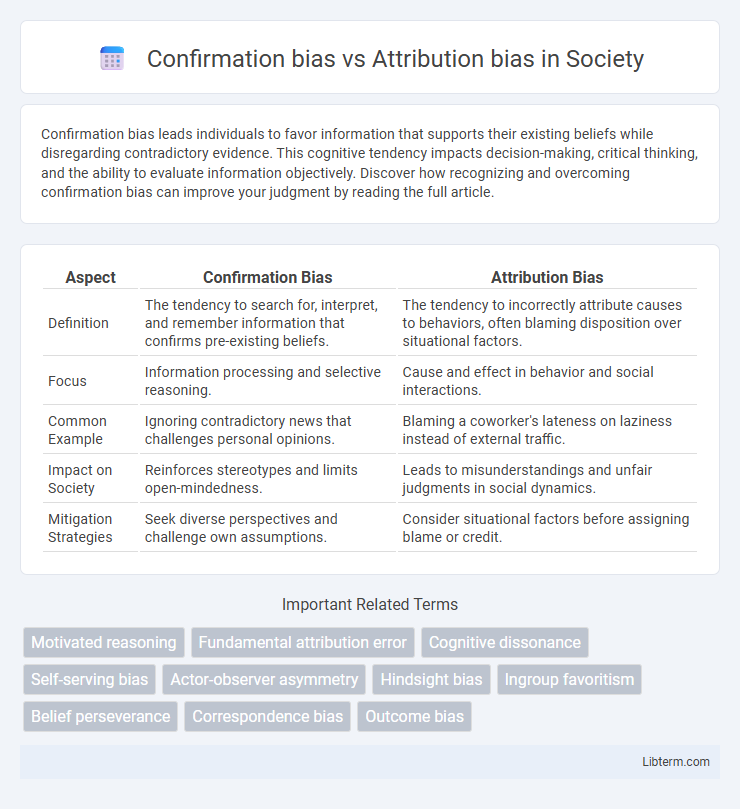Confirmation bias leads individuals to favor information that supports their existing beliefs while disregarding contradictory evidence. This cognitive tendency impacts decision-making, critical thinking, and the ability to evaluate information objectively. Discover how recognizing and overcoming confirmation bias can improve your judgment by reading the full article.
Table of Comparison
| Aspect | Confirmation Bias | Attribution Bias |
|---|---|---|
| Definition | The tendency to search for, interpret, and remember information that confirms pre-existing beliefs. | The tendency to incorrectly attribute causes to behaviors, often blaming disposition over situational factors. |
| Focus | Information processing and selective reasoning. | Cause and effect in behavior and social interactions. |
| Common Example | Ignoring contradictory news that challenges personal opinions. | Blaming a coworker's lateness on laziness instead of external traffic. |
| Impact on Society | Reinforces stereotypes and limits open-mindedness. | Leads to misunderstandings and unfair judgments in social dynamics. |
| Mitigation Strategies | Seek diverse perspectives and challenge own assumptions. | Consider situational factors before assigning blame or credit. |
Introduction to Cognitive Biases
Confirmation bias involves favoring information that confirms existing beliefs, leading to selective information processing and reinforcement of preconceived notions. Attribution bias refers to errors in assigning causes to behaviors, often attributing others' actions to character flaws while excusing one's own mistakes through situational factors. Both biases distort objective thinking by filtering perception through subjective lenses, impacting decision-making and interpersonal judgments.
Defining Confirmation Bias
Confirmation bias is the tendency to search for, interpret, and remember information that confirms preexisting beliefs or hypotheses, while disregarding evidence that contradicts them. This cognitive bias influences decision-making and perception by reinforcing existing views and limiting objective analysis. In contrast, attribution bias refers to errors in judging the causes of others' behavior, often attributing actions to personality traits rather than situational factors.
Exploring Attribution Bias
Attribution bias involves the systematic errors people make when inferring the causes of behavior, often attributing others' actions to internal traits while overlooking external factors. This cognitive bias significantly impacts social perception, leading to misunderstandings in interpersonal relationships and decision-making processes. Exploring attribution bias reveals its influence on judgment accuracy and highlights strategies to mitigate these distortions for improved communication and conflict resolution.
Key Differences: Confirmation vs Attribution Bias
Confirmation bias involves favoring information that confirms preexisting beliefs, leading individuals to selectively gather or interpret data to support their assumptions. Attribution bias pertains to the tendency to incorrectly assign causes to events, often attributing personal behavior to situational factors while attributing others' actions to their character. The key difference lies in confirmation bias influencing information processing to reinforce beliefs, whereas attribution bias distorts causal explanations for behavior and outcomes.
Psychological Roots of Both Biases
Confirmation bias stems from the psychological need to reduce cognitive dissonance by favoring information that confirms pre-existing beliefs, enhancing mental consistency and self-esteem. Attribution bias originates from the brain's tendency to simplify social judgments, often attributing others' behavior to dispositional factors while excusing one's own actions due to situational contexts. Both biases reflect underlying cognitive mechanisms aimed at preserving a coherent and stable sense of reality despite complex and ambiguous information.
Real-World Examples of Each Bias
Confirmation bias manifests when investors ignore contradictory evidence, leading to poor financial decisions, such as holding losing stocks because they seek information that supports their initial choice. Attribution bias emerges in the workplace when managers credit success to their own skills but blame failures on external factors, distorting performance evaluations. Both biases influence critical judgments, impacting areas like marketing strategies, medical diagnoses, and legal verdicts with real-world consequences.
Impacts on Decision-Making
Confirmation bias narrows decision-making by causing individuals to favor information that supports their preexisting beliefs, leading to selective evidence interpretation and flawed judgments. Attribution bias distorts evaluations by misattributing causes of behavior, often blaming external factors for personal failures and internal factors for others' mistakes, which impairs accurate assessment and accountability. Both biases reduce objectivity, increase errors in reasoning, and hinder effective problem-solving in critical decisions.
Overcoming Confirmation and Attribution Bias
Overcoming confirmation and attribution biases requires actively seeking diverse perspectives and contradictory evidence to challenge preexisting beliefs. Techniques such as reflective thinking, exposure to varied viewpoints, and critical self-assessment improve cognitive flexibility and reduce errors in information processing. Implementing structured decision-making frameworks enhances objectivity and minimizes the influence of subjective bias in evaluating information.
Relevance in Modern Society
Confirmation bias leads individuals to favor information that supports their preexisting beliefs, often reinforcing stereotypes and polarization in social and political contexts. Attribution bias causes people to misinterpret others' behaviors by attributing actions to character flaws rather than external circumstances, affecting interpersonal relationships and workplace dynamics. Both biases shape decision-making, highlighting the importance of critical thinking and self-awareness in mitigating misunderstandings and fostering social cohesion in modern society.
Conclusion: Managing Cognitive Biases
Effective management of cognitive biases like confirmation bias and attribution bias requires awareness and deliberate strategies such as critical self-reflection and seeking diverse perspectives. Incorporating training on cognitive bias recognition in decision-making processes enhances objectivity and reduces errors in judgment. Organizations benefit from structured feedback mechanisms and promoting a culture that values evidence-based reasoning to mitigate these biases comprehensively.
Confirmation bias Infographic

 libterm.com
libterm.com